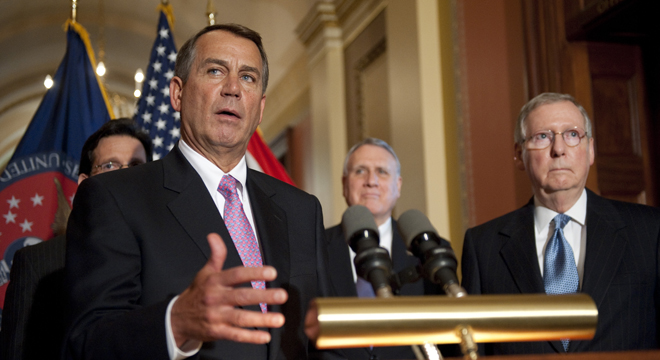Top Democrats are openly calling into doubt the chances that Congressional negotiators will reach an agreement to renew the payroll tax cut before it expires at the end of the month. The culprit, they say, is a deep schism within the Republican conference over whether the the tax holiday is a good policy or just a political gimmick to help President Obama win re-election.
The consequences of failure would result in a typical middle-class worker taking home about $1000 less this year, just as demand is starting to return to the U.S. economy and the unemployed are beginning to find work. Democrats, sensing political momentum from improving economic conditions, are warning Republicans that they’ll be held to account for the consequences if the tax cut ultimately lapses.
“Time is wasting, so that I’m very concerned about it, and whether or not they can get to agreement is in doubt at this point in time,” House Minority Whip Steny Hoyer told reporters at his weekly Capitol briefing Tuesday. “Democrats want to see the economy grow, and there are some here, frankly, who are just as satisfied to have the economy not grow, not create jobs, not have GDP growth, so it can help their politics.”
Many prominent GOPers either oppose the extension, or support it reluctantly, and then only on the condition that Democrats pay some sort of political price for having won the upper hand. However, others in the party want to avoid a repeat of the bruising fight in December, which continues to haunt the GOP.
For now, the hardliners are winning. And the result is a growing public fight over how to pay for the nearly $200 billion package — which would both renew the payroll tax cut, extend emergency unemployment benefits, and prevent an automatic cut to Medicare physician reimbursements. The battle comes as the GOP renews its demands of reforming the unemployment program to allow states to impose restrictions like drug testing on beneficiaries.
In private, House Republican conferees want to limit the negotiations over how to pay for the extenders to measures that have already passed at least one of the two Houses of Congress. This wipes measures like higher taxes on wealthy Americans, and war savings off the table, while preserving partisan GOP-backed payfors, including freezing federal worker pay, and increasing Medicare costs for some beneficiaries.
“The ‘outside of scope of conference’ argument they’re trying to make is silly,” says one Dem aide briefed on the discussions. “They can’t say out of one side of their mouths that Dems don’t have any proposals and then consider any we provide outside scope of conference. [Sen. Bob] Casey offered a 1% surcharge on millionaires and Dems offered to pay for [the Medicare doc fix] using [savings from winding down overseas military operations].”
This fight spilled into the open last week when Senate Majority Leader Harry Reid (D-NV) first hinted Democrats will ignite an explosive political assault on the GOP if it looks like the payroll tax cut will lapse. On Monday, Reid said Republicans were “holding [middle class] money hostage to extort political payback.” Dems, he said, “will prepare a fallback plan” and “will be prepared to act with or without Republican cooperation.”
House Speaker John Boehner and Majority Leader Eric Cantor lamented the “lack of progress” in the negotiations Monday night, and called for refocusing the conversation on the offsets House Republicans passed in December, and ruled out “tax increases on small business job creators” — an indication that their position hasn’t softened since the December battle.
Most economists believe allowing the payroll cut and extended unemployment compensation to lapse will blunt economic momentum. Also taking effect March 1 under current law are steep 27.4 percent cuts to Medicare physician payments, which both parties overwhelmingly want to avoid.
Three weeks is an eternity in legislative brinksmanship. But if Democrats took one lesson from their last bout with the GOP it was that – on this issue – they don’t need to preemptively concede to the GOP’s policy and budgetary demands. The longer they hold out, the deeper the division within the House Republican conference will grow, and the likelier the negotiations are to fall apart completely.









